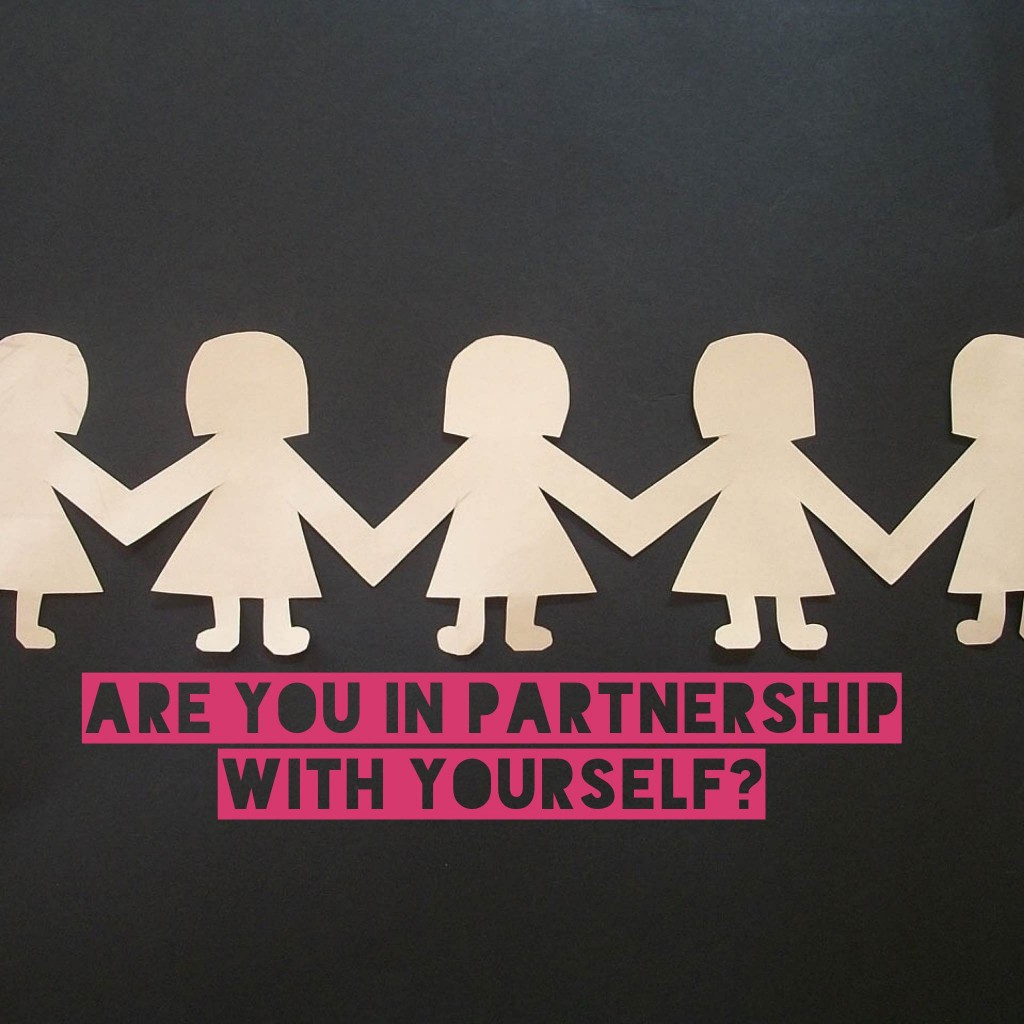 I’m passionate about creating true partnership between men and women, so we can all be in partnership with our planet to create a world we can all thrive in.
I’m passionate about creating true partnership between men and women, so we can all be in partnership with our planet to create a world we can all thrive in.
So, I’m taking a course based on Riane Eisler’s book, “The Power of Partnership.” I’ve been blessed to work with her directly in the past, and she is an amazing woman who has been inspiring me since the 80s.
Our first module is about our partnership with SELF – which is the place we have to start. We can’t create true partnership with others until we become a true partner with ourSELF.
For me, this means accepting ALL of me – even the parts that seem pretty dark or that look like they’re still sabotaging me in spite of all my years of personal growth work.
One issue that’s coming up again is the masculine vs. feminine within myself, and in our culture. I’ve found a more integrated way of looking at them in Riane’s work.
There are a lot of authors and coaches now working with “feminine principles,” “feminine power,” “feminine leadership models,” and “feminine” _______ (fill in the blank with your favorite). They encourage women to tune in to their “feminine” instead of their “masculine,” which has been causing them to push too hard, to burn out, to operate from a way of being that isn’t natural.
Let me be clear – I’m FOR the resurgence of the feminine. We need to bring the traditionally-considered-as-female qualities — caring, nurturing, collaboration, deep listening, going with the flow, doing without forcing, etc. — into businesses, our lives, and our culture. We also need to raise women up to true equal (partnership) status with men.
But, is it truly useful to separate parts of ourselves into “feminine” and “masculine?” What if doing that is actually reinforcing old stereotypes we need to shed? Riane’s perspective on this in “The Power of Partnership” is beautiful.
She says, “Gender roles aren’t cast in stone,” and that a good deal of what we hear these days about “essential masculinity and femininity” which are “traits and behaviors that are supposed to be inherently male or female” are actually a replay of old gender stereotypes, and may be getting in the way of our partnership with ourselves (first), then others.
When we say that logical/linear thinking, power and drive are “masculine,” we’re saying those are not natural qualities for a woman. When we say collaboration, deep listening, taking time for self, nurturing and caring are “feminine,” we’re saying those are not natural qualities for a man.
This can make women who have a lot of drive and love logical/linear thinking feel as though they are not a real woman. It also makes men who are naturally caring and nurturing feel “less than” a true man.
We also hear about our “inner masculine” if you are a woman, and our “inner feminine” if you are a man. This at least acknowledges those aspects as part of our SELF, but those terms can still subtly separate us from those parts we don’t identify easily with. It is absolutely true that
- the traditional “feminine” characteristics have been devalued and denigrated in our cultures worldwide,
- anything considered “feminine” has been considered inferior to anything “masculine” and
- healing our world requires bringing women and traditionally “feminine” qualities and values back to the fore so we can create a world that works.
But what if this way of looking at gender as having “essential” qualities that are separate and distinct actually holds us back in our personal development, and in our cultural development?
We’re beginning to recognize human sexuality as a continuum that includes heterosexuality, bisexuality, homosexuality, monogamy and polyamory. Our sexual organs don’t determine which of these we identify with.
Our different hormones DO play a role in how we express who we are. But men are not innately violent, and women are not innately nurturing. If gender behavior is also on a continuum, then caring, empathy, nurturing and non-violence are HUMAN values, whether they’re expressed by women or men.
Riane says: “When a woman is assertive and logical, she is not accessing her masculine side; she is simply expressing qualities that are her own. In the same way, when a man is gentle and caring, he is not accessing his feminine side, he is expressing a part of his own inherent nature that’s been stifled by dominator culture.
“By acknowledging that your good qualities – whether they’re thought of as masculine or feminine – are fine for you, you begin to enhance your sense of self worth. You stop berating yourself, and access your full humanity because you’re in touch with yourself as a full human being.” (Riane Eisler, “The Power of Partnership,” pp 15-16 – emphasis added)
I know through my work with voice that our speech is on a continuum, too. There is no “feminine speech,” or “masculine speech.” When my clients allow all parts of themselves to have a voice again, their speech takes on much more variety, expressiveness, passion, energy and confidence, whoever they are.
The size of your larynx and the length and thickness of your vocal folds determine your pitch range, not your sex. While hormones tend to create lower (male) or higher (female) voices, I know many women with deep voices, and many men with higher voices.
You need to sound like YOU – with all the aspects of yourself coming into full expression. That’s how you speak in partnership with yourself, and as a person who can create true partnership with others.
If you’d like to open up your voice to full partnership with yourself, let’s talk!
Click here to book a complimentary session.
To your healing, and the healing of our world –
![]()